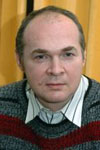
Lomonosov Moscow State University
Moscow
-
Multivariable Objects for Stimulation of Young Children's Combinatorial Experimentation and Causal-Experimental Thought
-
An important direction of human cognitive development is the development of abilities at activities in complex dynamical environments containing multiple interacting structures (Dorner, Frensch & Funke, Spector, Voss). Cognition of the interacting structures by experimentation is the main function of causal-experimental thought (Demetriou). Usually preoperational children are not considered to have well-expressed abilities for causal-experimental thought. In the paper I describe heuristic rules for design of didactic multivariable objects stimulating preschoolers’ combinatorial experimentation and causal-experimental thought, the objects designed, and several studies of the children’s cognitive activity (exploratory learning) aimed at the objects and revealing their abilities to combinatorial experimentation. Participants: 623 children of 3-7 years old. It has been shown that the children successfully explore the objects containing hidden mechanical, logical and mathematical relationships by using strategies of combinatorial experimentation of various levels of complexity.
DOI: 10.11621/pir.2011.0027
Keywords: combinatorial experimentation, preschool children, causal-experimental thought, cognitive development, multivariable object.
-
-
'Trojan Horse" Teaching
-
An advanced strategic behavior, which we term, “Trojan horse” teaching (THT), is described. In this type of counteractive behavior, a “teacher”, ostensibly helping his or her rival to learn something, really teaches the rival useless or disadvantageous things. This interaction is an object of interdisciplinary research related to the theory of human capital, the theory of agency, knowledge management, the theory of conflict, and to social and educational psychology. Examples of THT in real life, and results of experiential studies, including the administration of a survey concerning people’s beliefs about teaching “with evil intent”, and a set of experiments with participation of adults and children, have been described. Possible directions of artificial intelligence systems development related to THT are described. General relations between: (a) counteraction to learning, and (b) development in spite of the counteraction are discussed.
DOI: 10.11621/pir.2009.0017
Keywords: teaching, learning, competition, conflict, deceiving, Trojan horse teaching.
-









